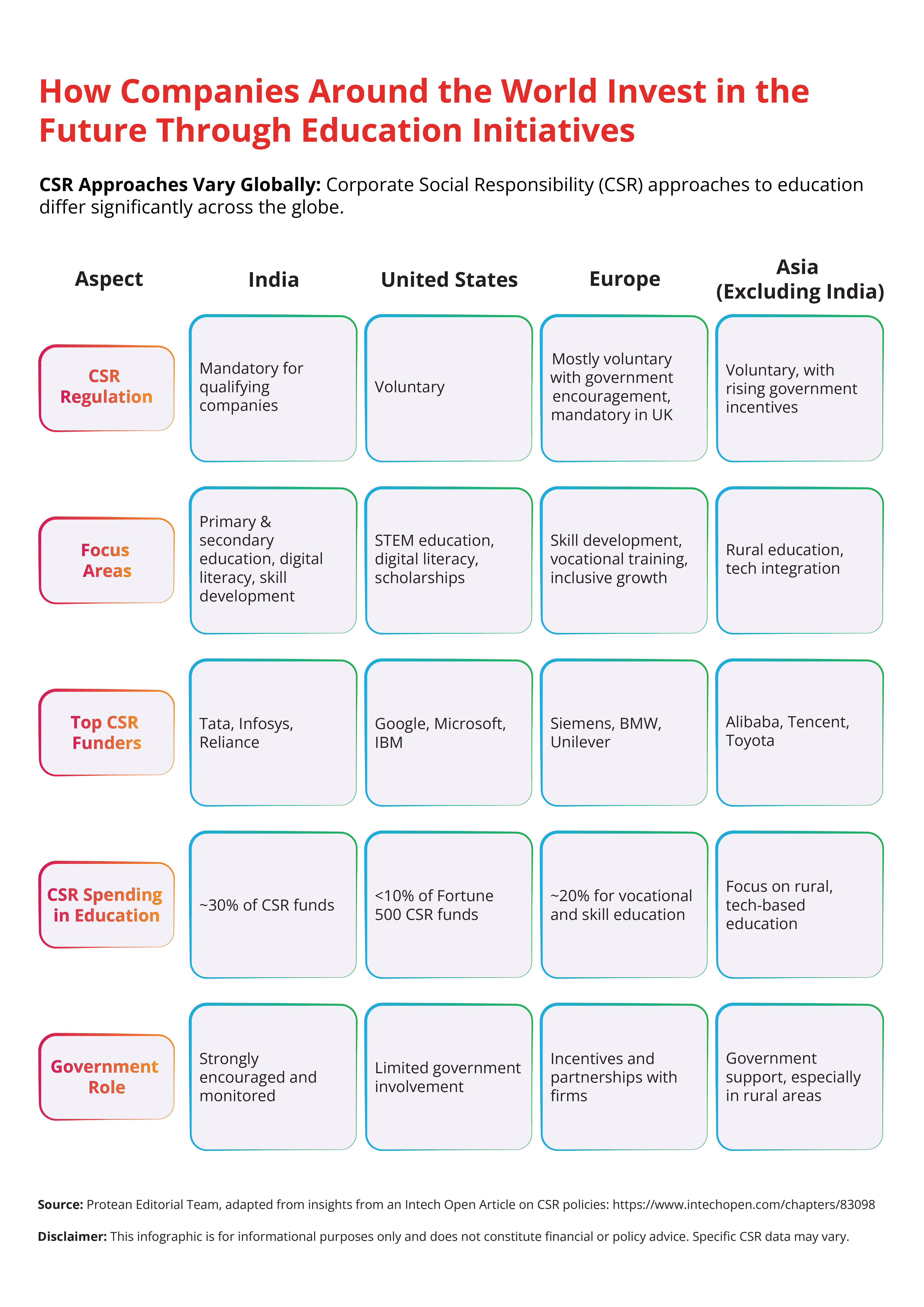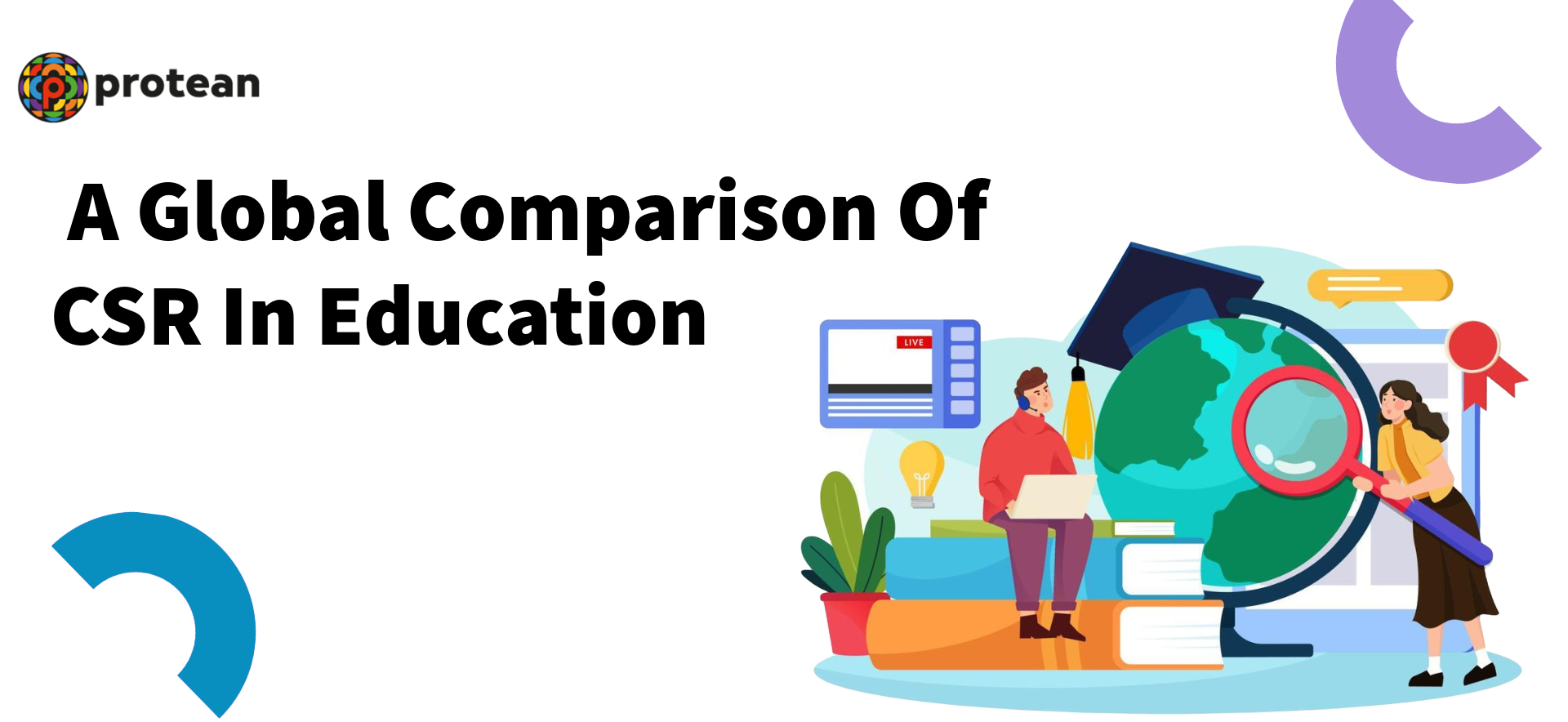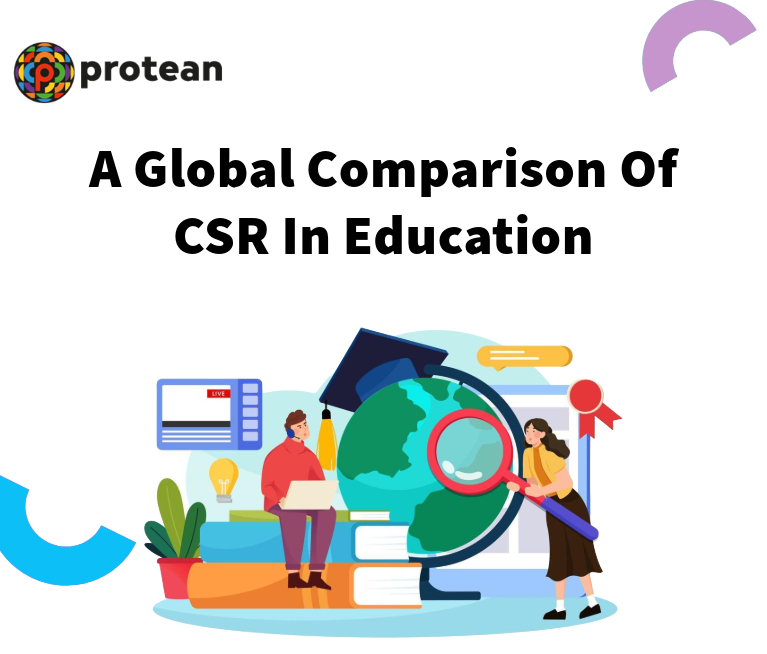Corporate Social Responsibility (CSR) is an essential framework where businesses incorporate social and environmental concerns into their operations and interactions. Education is one of the most critical sectors for CSR globally, as it directly impacts economic growth, social development, and future generations' well-being.
| Want to boost your organization's CSR impact? Connect with our experts now, and explore thoughtful CSR initiatives. https://www.proteantech.in/contact-us/?utm_source=Website&utm_medium=blog&utm_campaign=CSR_stories |
Introduction to CSR in Education
The corporate world increasingly recognises the importance of contributing to societal growth, and education is at the forefront of these efforts. Education-oriented CSR initiatives aim to tackle critical issues like poverty, inequality, and skill development, supporting sustainable community growth. India, with a rapidly expanding economy and vast population, has embedded CSR into its corporate framework, especially for educational support. Globally, CSR initiatives vary widely, shaped by regional socio-economic conditions, corporate governance standards, and government policies.
| Learn more about education-oriented CSR initiatives here. |
CSR in Education in India: An Overview
India introduced a mandatory CSR law in 2013 under the Companies Act, requiring companies meeting specific criteria to allocate at least 2% of their average net profit over the previous three years to CSR activities. Education has emerged as one of the top areas for CSR investment, as it addresses many socio-economic issues, including literacy, employment, and social mobility.
- Allocation of CSR Funds to Education: According to the National CSR Portal, over 40% of CSR funds in India are directed towards education, skill development, and vocational training. This aligns with India’s developmental goals and the Sustainable Development Goals (SDGs).
- Government Policies and Implementation: India's CSR policies emphasise transparency, accountability, and strategic alignment with developmental needs. Companies often collaborate with non-profits, educational institutions, and government agencies, implementing various initiatives such as school infrastructure improvement, digital literacy programs, and scholarships.
- Key Examples: Companies like Infosys, Tata Group, and Reliance have made significant contributions to educational development. For instance, the Tata Group’s initiatives focus on improving primary and secondary education through scholarships, teacher training programs, and technology in classrooms.
| To see the impact of digital transformation on CSR in the education sector, click here. |
Global CSR in Education Initiatives
A landmark study conducted by the Varkey Foundation and UNESCO on global corporate CSR spending reveals a significant gap in education-related funding. The 2013 report shows that Fortune Global 500 companies allocate only $2.6 billion, or 13%, of their total $19.9 billion CSR budget to education. Additionally, less than half of these companies dedicate any portion of their CSR funds to educational initiatives, with most prioritising sectors like health.
The report highlights that if the Fortune Global 500 companies directed at least 20% of their CSR budgets toward education, total funding could increase from $2.6 billion to $4 billion, potentially providing primary education access to over 3 million more children annually. Irina Bokova, UNESCO’s Director General, noted the vast opportunity for corporations to make impactful investments in education, especially in developing regions where a skilled, educated workforce fuels sustainable growth and economic equality.
Banco Santander leads the top ten education CSR spenders, averaging $197 million per year, followed by IBM ($144 million), Telefonica ($130 million), Exxon Mobil ($116 million), and Target ($95 million). The list also includes GlaxoSmithKline, Microsoft, Toyota, Rio Tinto, and Wells Fargo. These figures represent annual averages from 2011 to 2013.
This study, released just ahead of the World Economic Forum in Davos, seeks to amplify the Business Backs Education campaign, a joint initiative by the Varkey Foundation, UNESCO, and Dubai Cares. The campaign challenges companies globally to allocate 20% of their CSR budgets to education by 2020, reinforcing the connection between education investment, business growth, and societal prosperity.
| Our specialists can help you conceptualise your CSR initiatives with an edge! Schedule a consultation today. https://www.proteantech.in/contact-us/?utm_source=Website&utm_medium=blog&utm_campaign=CSR_stories |
United States
In the United States, CSR is voluntary and driven by corporate social values and stakeholder expectations rather than mandates. American companies often partner with educational institutions, NGOs, and government programs to support underprivileged schools and fund educational technology.
Europe
European countries emphasise sustainability, human rights, and inclusive growth in CSR activities. Education is a primary focus, with CSR initiatives aimed at skill development, vocational training, and higher education accessibility.
In Germany, large corporations like Siemens invest heavily in vocational training, developing programs that bridge the gap between education and employment, an initiative that has helped reduce youth unemployment rates.
- Transatlantic Education Programs: According to a study by Cambridge University, the European Union and the U.S. have introduced several transatlantic educational CSR programs.
For instance, the Erasmus+ program enables students to gain international experience, supported by corporate sponsorships from companies like Deloitte and BMW.
Asia (Excluding India)
Asian nations like Japan, China, and South Korea have robust CSR initiatives in education, driven by a mix of voluntary standards and government encouragement. In China, CSR in education emphasises rural development, while Japanese corporations prioritise technological and sustainability education.
Chinese tech giants, including Tencent and Alibaba, have invested millions in educational technology and infrastructure in rural areas. Japan’s Toyota and Sony are known for their CSR in education, focusing on sustainability and STEM.
Comparative Analysis: CSR Policies in Education
Using insights from the IntechOpen article on CSR policies, we can see stark contrasts and similarities in CSR approaches across regions. 
Impact of CSR in Education on Societies
CSR in education has a lasting impact on societies, uplifting communities, reducing inequalities, and fostering economic growth. Here are some observed impacts globally:
- Bridging the Digital Divide: CSR initiatives in the U.S. and India are helping address the digital divide, with companies funding digital literacy programs and providing devices to underserved communities.
- Employment and Skill Development: European companies emphasise vocational training through CSR, which has been crucial in reducing youth unemployment rates. Similarly, Indian CSR projects are increasingly focused on skills that match industry needs, reducing the skill gap.
- Quality of Education: In developing countries, CSR has improved infrastructure and access to education. For example, India’s CSR initiatives have contributed to better school facilities, teacher training, and scholarships, particularly in rural areas.
Challenges and Limitations
While CSR has made substantial contributions to education, there are limitations and challenges:
- Funding Constraints: In regions where CSR is voluntary, funding for education remains inconsistent. For example, UNESCO reports that only a fraction of CSR funds go to education globally, with health and environment often taking precedence.
- Monitoring and Impact Assessment: Assessing the long-term impact of CSR in education is challenging, especially when initiatives lack transparency and consistent evaluation. India’s mandatory CSR framework aims to address this, but gaps in impact assessment still exist.
- Regional Disparities: CSR efforts often focus on urban areas or regions with a stronger corporate presence, leaving rural areas underserved. This issue is prevalent in both India and the U.S., where rural areas face greater educational challenges.
Successful CSR Initiatives in Education
Infosys Foundation (India)
Infosys Foundation’s commitment to education is grounded in its vision to make quality learning accessible and inclusive for underserved communities in India. The Foundation’s initiatives target systemic challenges in education, providing essential resources, infrastructure, and scholarships to support students from diverse backgrounds. By prioritising school infrastructure, digital literacy, and teacher training, Infosys Foundation works to create sustainable, long-term improvements within educational institutions across the country.
One of the core areas of focus is upgrading educational facilities in rural and underserved regions, ensuring that students have safe, conducive environments for learning. Through collaborations with schools and educational organisations, Infosys Foundation has constructed classrooms, laboratories, and libraries, enriching the learning ecosystem for thousands of students. The Foundation also emphasises digital empowerment by supporting technology-driven education and e-learning resources, equipping students and teachers with tools to adapt to a rapidly evolving educational landscape.
Moreover, Infosys Foundation’s scholarship programs have opened doors for students who may otherwise lack the means to pursue higher education, bridging socio-economic gaps and fostering academic potential. By working closely with communities, the Foundation aligns its initiatives to meet local educational needs, reinforcing its mission to build a more inclusive, equitable, and empowered society through education. This commitment not only uplifts individual learners but also contributes to the broader social and economic development of India.
Google’s CSR in Education (The U.S.)
Google’s commitment to transforming education underscores its mission to make learning accessible, equitable, and innovative for students and educators worldwide. Through a series of global initiatives, Google is bridging gaps by providing access to technology, promoting digital literacy, and supporting the professional development of educators. A key aspect of this mission is the focus on building inclusive learning environments that cater to diverse learning needs, helping students to thrive regardless of location or background.
To advance this goal, Google offers tools like Google Workspace for Education and Chromebooks, designed to enhance collaboration and engagement in the classroom. Beyond just software and hardware, Google prioritises empowering educators through resources and training, ensuring they have the necessary skills to leverage technology effectively in teaching. The company has also invested in programs aimed at increasing access to STEM education, coding, and career readiness, helping students build the skills required for the digital economy.
With initiatives such as "CS First," a free computer science curriculum, and the "Grow with Google" program, which offers free tools and training for career advancement, Google is nurturing future innovators. This commitment, coupled with partnerships with nonprofits, governments, and educational institutions, reflects Google’s dedication to a future where every learner has the opportunity to reach their full potential. Through these efforts, Google strives to foster a global community of students and educators equipped to face the challenges of an increasingly digital world.
Siemens and Vocational Training (Germany)
Siemens has played a key role in Germany’s vocational training system, offering apprenticeships that allow students to gain practical skills alongside their studies. This initiative has become a model for corporate-funded vocational training worldwide
Through various programs, Siemens leverages its expertise in technology to make a positive impact in critical areas like education, healthcare, and environmental sustainability. Siemens is dedicated to creating long-term value, not only for business and employees but also for society and the planet.
In education, Siemens promotes STEM learning and digital skills through partnerships with schools and universities, nurturing future-ready talent equipped to thrive in an increasingly digital world.
Future Directions for CSR in Education
Given the evolving socio-economic landscape and the urgent need for educational reform, CSR in education is likely to focus on the following areas:
- Sustainability in Education: Environmental education is gaining traction as companies seek to build a more environmentally conscious generation. CSR programs that integrate sustainability into curricula are expected to grow.
- Increased Digital Focus: The pandemic has highlighted the importance of digital access in education. Future CSR initiatives are expected to invest in online learning platforms, especially in emerging economies like India and African nations.
Collaborations and Partnerships: To maximise impact, corporations may increasingly collaborate with governments, NGOs, and international organisations, ensuring broader reach and efficient resource utilisation.
| Revolutionise your CSR approach now! Partner with us to create history with your CSR impact. https://www.proteantech.in/contact-us/?utm_source=Website&utm_medium=blog&utm_campaign=CSR_stories |
Conclusion
CSR in education remains a powerful tool for companies to contribute to society’s growth while aligning with their business objectives. India’s structured CSR framework has encouraged substantial investments in education, setting an example for other nations. Meanwhile, the voluntary CSR approach in countries like the U.S. and Germany has produced innovative, targeted programs addressing specific educational needs. As CSR evolves, there is an opportunity for greater global collaboration, creating a world where educational opportunities are accessible, equitable, and aligned with the future’s socio-economic demands.
Also Read:
- India's CSR Journey: A Decade of Transformation (2014-2024)
- Unspent CSR Funds in India: Untapped Potential in 2023
- Maximise Your CSR Impact: India's Sector-Wise Allocation 2024
- Customising Scholarship Programs to Align with Corporate Goals
- Enhancing CSR Efficiency with Vidyasaarathi: A Corporate Guide
story by Bruhadeeswaran R.

